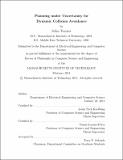Planning under uncertainty for dynamic collision avoidance
Author(s)
Temizer, Selim, 1977-
DownloadFull printable version (8.030Mb)
Other Contributors
Massachusetts Institute of Technology. Dept. of Electrical Engineering and Computer Science.
Advisor
Leslie Pack Kaelbling and Tomás Lozano-Pérez.
Terms of use
Metadata
Show full item recordAbstract
We approach dynamic collision avoidance problem from the perspective of designing collision avoidance systems for unmanned aerial vehicles. Before unmanned aircraft can fly safely in civil airspace, robust airborne collision avoidance systems must be developed. Instead of hand-crafting a collision avoidance algorithm for every combination of sensor and aircraft configurations, we investigate automatic generation of collision avoidance algorithms given models of aircraft dynamics, sensor performance, and intruder behavior. We first formulate the problem within the Partially Observable Markov Decision Process (POMDP) framework, and use generic MDP/POMDP solvers offline to compute vertical-only avoidance strategies that optimize a cost function to balance flight-plan deviation with risk of collision. We then describe a second framework that performs online planning and allows for 3-D escape maneuvers by starting with possibly dangerous initial flight plans and improving them iteratively. Experimental results with four different sensor modalities and a parametric aircraft performance model demonstrate the suitability of both approaches.
Description
Thesis (Ph. D.)--Massachusetts Institute of Technology, Dept. of Electrical Engineering and Computer Science, 2011. This electronic version was submitted by the student author. The certified thesis is available in the Institute Archives and Special Collections. Cataloged from student submitted PDF version of thesis. Includes bibliographical references (p. 157-169).
Date issued
2011Department
Massachusetts Institute of Technology. Department of Electrical Engineering and Computer SciencePublisher
Massachusetts Institute of Technology
Keywords
Electrical Engineering and Computer Science.